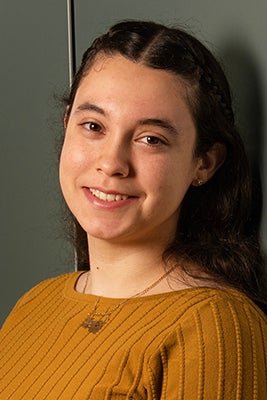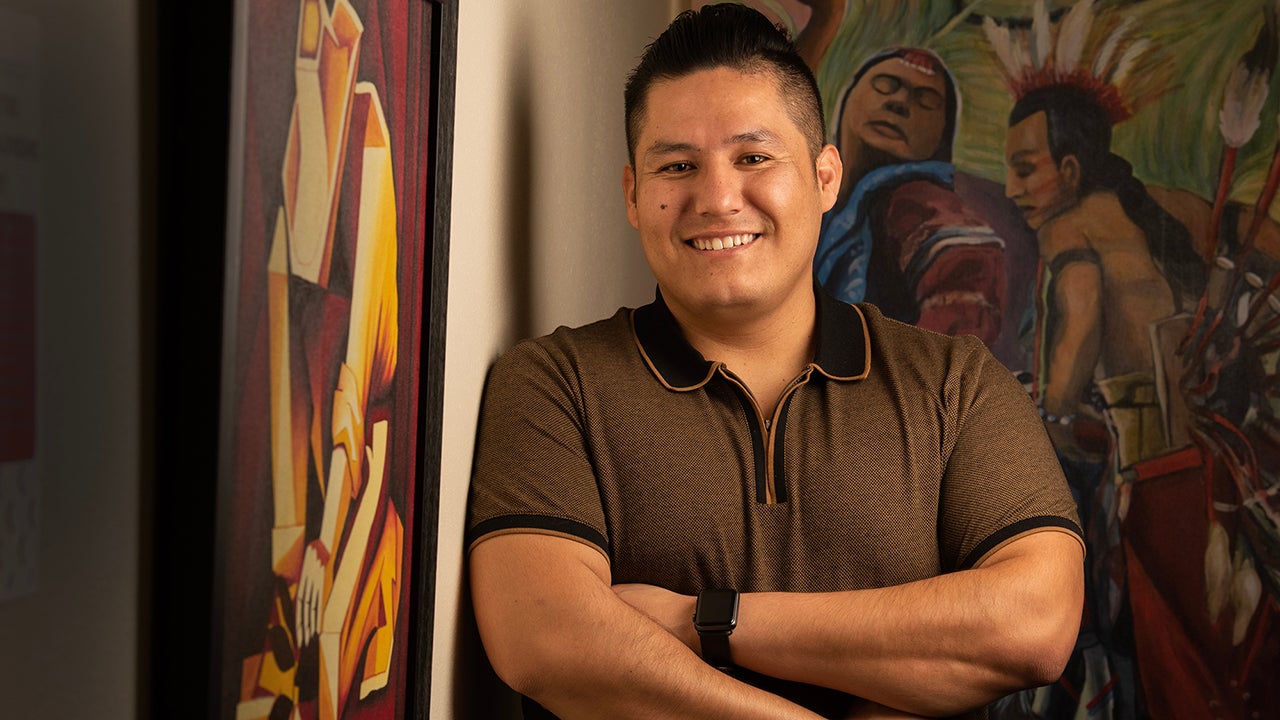UC Davis Students, Faculty and Staff Benefit From Campus’ HACU Membership
by Julia Ann Easley March 05, 2024

A series of five deaths in her extended family had devastated Jasmine Diaz, and the neurobiology, physiology and behavior major was on academic probation through 2022. She had given up her dream to become a doctor or even to continue in science.
Today, the fifth-year student is thrilled to be working in the cancer lab of Professor Luis Carvajal-Carmona, is recommitted to a career in science, and has a passion to help underrepresented and first-generation students.
“I’m a stronger person and a strong advocate for people like myself,” Diaz said.
What happened in between? Some mentoring, tutoring and an invitation to the annual conference of the Hispanic Association of Colleges and Universities, or HACU.
Since 2005, UC Davis has been a member of HACU, the only national association representing existing and emerging Hispanic-Serving Institutions, or HSIs. While the campus nears federal recognition as an HSI, its membership continues to bring benefits to students, faculty and staff.
Faculty and staff have opportunities for collaboration and professional development. And students can attend conferences to learn and network, win scholarships and complete corporate and government internships available through the organization.
Chancellor Gary S. May has been a HACU board member since October 2022 and serves on its government relations committee.
‘Doors do open’

At HACU’s annual conference in Chicago in October, Diaz said, she attended informational and motivational workshops – including one on home ownership. At a dinner there leaders of UC Davis’ Diversity, Equity and Inclusion, or DEI, initiative, she also shared her heartbreak to have left science behind.
Diaz later spoke with Carvajal-Carmona, associate vice chancellor for academic diversity and a professor of biochemistry and molecular medicine, who invited her to work in his lab. Carvajal-Carmona, who is a first-generation college graduate, has a strong record of supporting and mentoring students like Diaz and in 2021 received the Chancellor’s Award for Excellence in Mentoring Undergraduate Research.
In the lab, several researchers are mentoring Diaz to help her fulfill her aspirations of going to graduate or professional school. Diaz said she wants to inspire the students she works with as a peer ambassador with Undergraduate Admissions and a student outreach assistant with the Early Academic Outreach Program. “I use myself as an example,” she said. “Even if it’s a roller-coaster journey, doors do open.”
In October, HACU representatives came to UC Davis and shared information about internships and scholarships — more than $1 million was awarded in 2022. About 90 students attended the October session.
‘It shaped my passion’
HACU played a role in Rodrigo Bonilla’s career as the director of Chicanx Latinx Retention Initiative and the Center for Chicanx Latinx Academic Student Success.
“One of the major reasons I’m in higher education — I’m truly the byproduct of this organization that led me in that direction,” Bonilla said.

Having immigrated from Mexico at age 9, Bonilla had been a farmworker until he went to Washington State University in Pullman, where he studied agriculture food systems, agriculture economics and Spanish.
There, a mentor steered him toward a HACU internship with the U.S. Department of Agriculture’s rural development unit in Davis in summer 2015 before he started a master’s degree in international agriculture development at UC Davis.
At the weeklong training for interns in Washington, D.C., Bonilla said, he “connected with people who supported students and opened doors.
“It shaped my passion for supporting students from similar backgrounds,” he said.
Bonilla joined UC Davis as a student affairs officer in 2018, became interim associate director for the Chicanx Latinx Retention Initiative and the Center for Chicanx Latin Academic Success in 2021 and was hired as director in March 2022.
Now pursuing a doctoral degree in educational leadership, Bonilla has regularly attended HACU conferences. At the annual conference in October, he presented on the academic retention model to support Latinx students at UC Davis. “It’s wild how it was a full circle moment for me,” Bonilla said.
Lina Mendez, director of the campus’s HSI initiative at UC Davis, and others have participated in leadership academies offered by HACU. “The fact that they’re thinking about how to prepare and train the leaders of the future is a really good mentoring opportunity,” she said.
Grants for HSI work
In addition to providing opportunities for students, faculty and staff, the association advocates for grant programs to improve access to and the quality of higher education for Hispanic students, said Antonio R. Flores, president and CEO of HACU.
“Part of our job is to increase those pots of money and relay to our institutions that they can use them for the benefit of underserved students,” he said.
Mendez said UC Davis learned about the California Regional K-16 Education Collaborative Grant Program through HACU. That gave UC Davis a head start in preparing what were successful applications, she said.
As a participant in three regions, UC Davis is using about $3 million in grants to help reduce inequities in higher education and workforce participation. The funding is helping support the campus’s outreach, recruitment and admission efforts including SAYS (Sacramento Area Youth Speaks); the Avenue programs in engineering, medicine and biological sciences; and more.
Nearly two decades of help
UC Davis joined HACU — headquartered in San Antonio with regional offices in Washington, D.C., and Sacramento — almost two decades ago as an associate member, an institution whose Hispanic enrollment constitutes at least 10% of enrollment. In 2019, 2021, 2022 and 2024, UC Davis qualified as an HSI member, with at least 25% Hispanic enrollment at the undergraduate or graduate level or both.
UC Davis continues to pursue designation by the federal government as an HSI to allow it to apply for funding to support student success, innovation and institutional transformation, benefiting all students. The U.S. Department of Education grants the designation to institutions that first meet the threshold of having enrollment of undergraduate full-time equivalent students that is at least 25% as counted at the end of the award year — and then meet other criteria. By this definition, UC Davis had 24.6% Hispanic enrollment in fall 2023.
In October, Hispanic Outlook on Education Magazine recognized UC Davis as a top 100 university for Hispanic and Latino students in its annual lists. UC Davis ranked 31st for the number of bachelor’s degrees awarded to Hispanic/Latino students (2,014) and 71st for total enrollment among four-year institutions (9,225).
Flores said UC Davis has been one of the most progressive universities in the nation in terms of diversity and inclusion. “We are delighted UC Davis is continuing as a role model for the rest of California and across the nation,” he added.
Media Resources
Media Contact:
Julia Ann Easley, News and Media Relations, jaeasley@ucdavis.edu, 530-219-4545